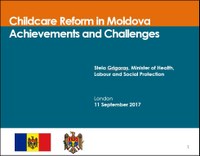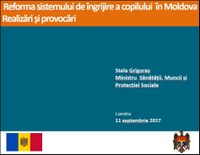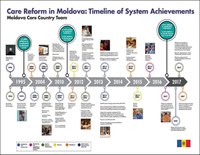Moldova
The Republic of Moldova is a landlocked, low- to middle-income country in Eastern Europe. Enrollment in education and life expectancy there are relatively high; the employment rate, however, is low (40 percent). Poverty therefore is an issue, and disproportionally affects children, who make up almost 20 percent of Moldova’s 3.5 million people. Out-migration of about one-third of the working-age population also affects children in Moldova, some of whom are left behind by both parents.
|
To learn how this work is continuing after the MEASURE Evaluation project, please visit Data for Impact. |
|---|
The historical social norms that have vested the state with primary responsibility for raising children have led to the institutionalization of thousands of children. Over the last two decades, Moldova has made significant efforts to develop alternative family-type services and promote inclusive education, thereby decreasing the number of institutionalized children from 17,000 in 1995 to 1,365 in 2016 and integrating more than 10,000 children with disabilities in mainstream education.
The situation is already improving. The government is working in partnership with nongovernmental organizations to develop services to prevent children being unnecessarily separated from their families and tracking children who have been re-unified. A priority is the strengthening of the monitoring and evaluation (M&E) of governance structures, information systems, and data quality assurance for care reform. Yet, despite this progress, the care system of Moldova still faces many challenges.
MEASURE Evaluation—funded by the United States Agency for International Development (USAID)—began work in Moldova in May 2017. Our task was to strengthen the capacities of government partners to assess, address, and monitor child care reform, in line with the United Nations’ Guidelines for the Alternative Care of Children.
MEASURE Evaluation supported the government partners to:
- Provide leadership in implementing a structured assessment of national childcare reform systems and strategies using a standardized framework or tool
- Identify gaps and continuing needs in childcare reform
- Develop plans to address priority needs
- Establish monitoring indicators and systems for regular assessment of progress and monitoring of results against country plans for childcare reform
Related Content
Assessing Alternative Care for Children in Moldova: Assessment Report (Volume 1)
Evaluarea Îngrijirii Alternative a Copilului în Moldova: Raport de Evaluare (Volumul 1)
Assessing Alternative Care for Children in Moldova: Appendixes (Volume 2)
Evaluarea Îngrijirii Alternative a Copilului în Moldova: Raport de Evaluare (Volumul 2)
Îngrijirea alternativă a copilului Buletin informativ
Moldova will benefit of support for assessing, addressing and monitoring the child care reform (Romanian)
Improving Care for Vulnerable Children
 |  |  |
|---|












